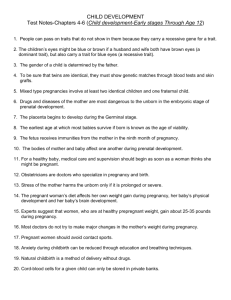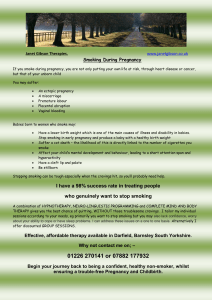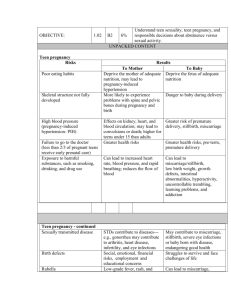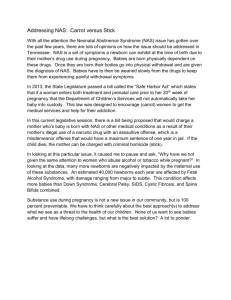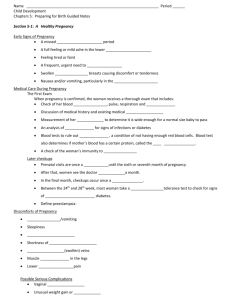Reproductive Life Planning
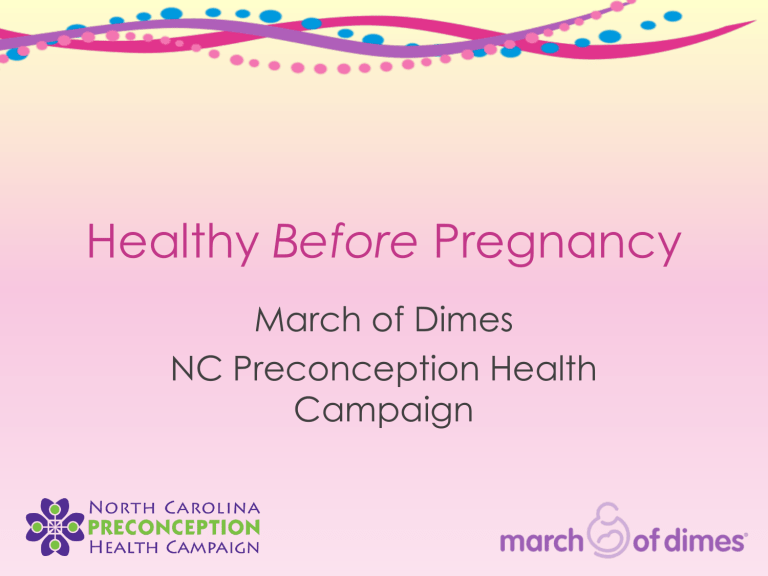
Healthy Before Pregnancy
March of Dimes
NC Preconception Health
Campaign
Reproductive life planning:
Lesson Plan 5
What’s your plan?
• The possibility of having a baby is way off in the future
• Having sex but not ready for kids?
• Already a parent but think more children might fit into your plan?
• Never want to be a parent?
Have you heard of….
• Pregnancy intendedness?
Unintended pregnancies:
What’s the big deal?
• Women are more likely to have:
• Babies that are too small
• Babies that die before their first birthday
Unintended pregnancies:
What’s the big deal?
• Women are less likely to:
• Be taking a daily multivitamin
• Seek prenatal care in the first trimester
• Be healthy during pregnancy
• Breastfeed their babies
What is a
Reproductive Life Plan?
• Part of an overall LIFE plan
• Determining when (and if) having children fits into your life plan
• Taking steps to achieve optimal physical health, emotional well-being and financial independence and stability PRIOR to starting a family
Your overall LIFE plan
• What are your personal goals?
• Education
• Job
• Romantic partnership
• Friends
• Life experiences
• Values
If and when…
• Do you want to become a parent at all?
• If yes, at what age?
• If yes, what other accomplishments do you want to have achieved first?
• If yes, what would you like to have in place first?
If and when…
• If you want to be a parent at some point how many children would you like to have?
• How far apart would you like your children to be spaced ?
Teen mothers have...
• Increased risk of premature and low birth weight babies
• Higher rates of infant death (babies dying)
• Higher rates of smoking
• Less access to prenatal care
• Higher risk of premature labor, anemia and high blood pressure
• Less education and higher rates of poverty
Teen pregnancy in NC
• 58.6 out of every
1,000 teen girls ages
15 to 19 became pregnant in 2008
• Minority teens at higher risk
• Hispanic teens at especially high risk
• Teens in rural counties are at higher risk than urban
Don’t be in the “Fog Zone”
• Align your plans for pregnancy and family with your sexual choices
Getting ready: Physical health
• Take a multivitamin with 400 micrograms
(mcg) of folic acid every day
• Get wellness checkups every year and regular dental checkups
• Eat healthy food, maintain a healthy weight and get/stay fit
Getting ready: Physical health
• Understand the risks of certain prescription drugs if you were to become pregnant
• Stop smoking and avoid secondhand smoke
• Stop drinking alcohol
• Don’t use illegal drugs
Getting ready: Physical health
• Use safe sex practices (ie: condoms) to avoid sexually transmitted infections because some can harm a fetus
• Avoid hazardous substances and chemicals
• Talk to you health care provider about your family history, genetics and birth defects
• Find healthy ways to manage stress
Getting ready: Emotional well-being
• Do you want to have a baby?
• How will a child affect your relationship with your partner? Are you both ready to become parents?
• If you’re not in a relationship, are you prepared to raise a child alone? Who will help you?
Getting ready: Emotional well-being
• How will a baby affect your education or career plans?
• Do you and your partner have religious or ethnic differences?
• What will you do for child care?
• Are you prepared to parent a child who is sick or has special needs?
Getting ready: Emotional well-being
• Are you ready to give up most of your free time to care for a child?
• Do you enjoy spending time with children?
• What do you want for your child?
Getting ready: Financial independence
• Are you financially independent?
• Do you have a steady income and health insurance?
• Can you provide the type of home, transportation, food, clothes, diapers, etc. that a baby needs?
• What about childcare?
Getting ready: Financial independence
• Babies and kids are expensive—Child care, food, clothing and doctor’s appointments add up!
New social norm
• Unless you are seeking pregnancy and are committed to the years that it takes to raise children, take active steps to prevent pregnancy now
New social norm
• Young men should take a leadership role in their romantic relationships to prevent pregnancy if a pregnancy is not fully intended at that time
Take care of yourself
• The health and lifestyle choices you make today can affect the health of your future family
• Revisit your reproductive life plan at least once a year
• Advocate for yourself, your body and your life goals
New social norm
• Don’t resign yourself to the idea of
“If it happens, it happens”
• Take control over your own reproductive lives today, tomorrow and in years to come
